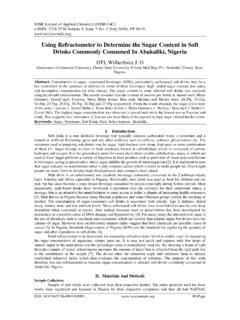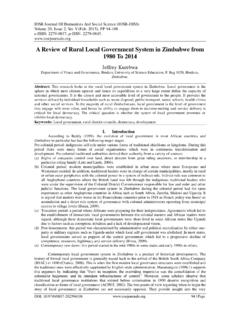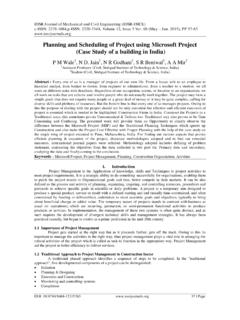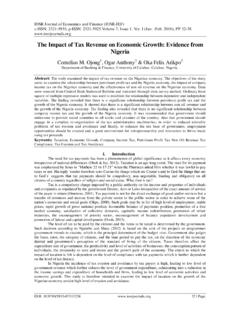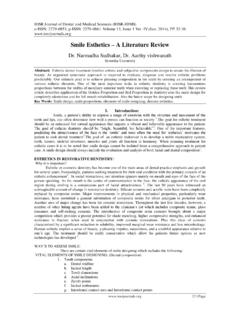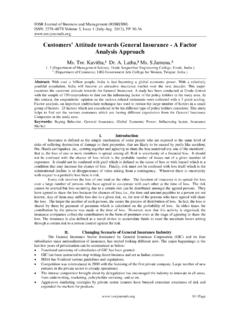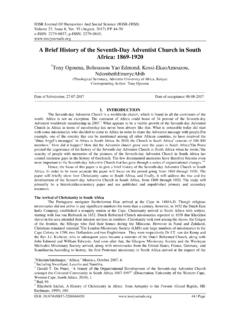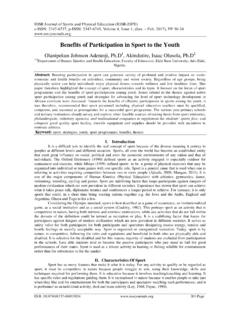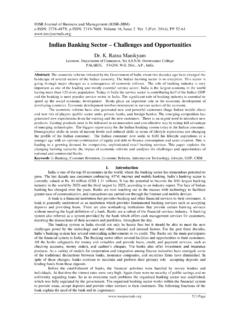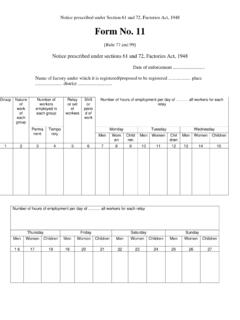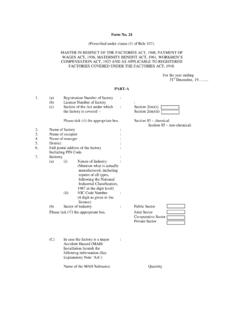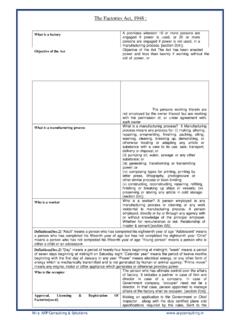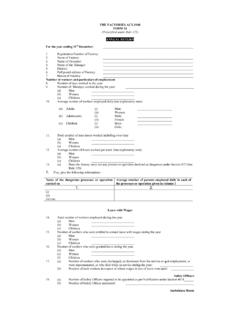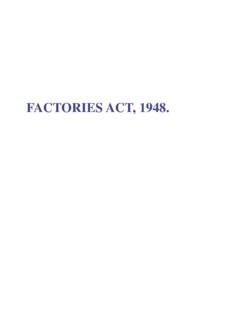Transcription of Status of Provisions of the Factories Act, 1948 - A study ...
1 IOSR Journal of Business and Management (IOSR-JBM) e-ISSN: 2278-487X, p-ISSN: 2319-7668. Volume 16, Issue 3. Ver. I (Mar. 2014), PP 14-26 14 | Page Status of Provisions of the Factories Act, 1948 - A study at Penna Cement Industries Limited (PCIL), Tadipatri. Keerthi Sriya A1, Dr. Panatula Murali Krishna2 1 Research Scholar, Department of Management, JNTU, Anantapur, Andhra Pradesh, India 515003, 2 Professor in the Dept. of Management (SKIM), SK University, Andhra Pradesh, India 515003, Abstract: This research paper focus on exploring the Status of awareness & satisfactory levels of various Provisions of Indian Factories act, 1948 in the target organisation Penna Cement Industries Limited located at Tadipatri in Anantapur district of Andhra Pradesh. The paper initially describes the background of Labour Legislation in India and its classification.
2 The need, importance and objectives of the research is than stated followed by the Literature review that briefs the important Provisions of the Factories Act pertaining to Labour and the Industry & Company profile where the research is conducted. The research targets to know the awareness and satisfactory levels of the Provisions of Factories act among the lower class of employees by taking a sample of 50 employees by Random Sampling method from the total population of lower class of employees in the organisation. The primary data collected through the Interviewing and Questionnaires. The questionnaire was made as simple as possible and where required it was read out & explained in the local language to many of the employees by the researcher because the majority of the sample population were not well educated.
3 The secondary data was collected through various company publications like Annual Reports, Files and documents related to labour welfare and books, journals, research articles related to Factories Act, 1948 . The results indicate that the overall awareness levels of the various Provisions of the Factories Act, 1948 is not very high but the satisfactory levels with the facilities provided by the organisation seems to be adequate among the sample employees. In simple words, though the sample employees are not very much aware of the facilities they are to be provided by the Factories Act, 1984, they are being provided with adequate health. Safety & welfare measured by the organisation which is keeping the employees satisfied. Keywords: Labour Legislation, Factories Act, 1948 , Health, Safety, Welfare, Awareness, Satisfaction Levels I.
4 Introduction India s Labour Policy is mainly based on Labour Laws. The labour laws of independent India derive their origin, inspiration and strength partly from the views expressed by important nationalist leaders during the days of national freedom struggle, partly from the debates of the Constituent Assembly and partly from the Provisions of the Constitution and the International Conventions and Recommendations. The relevance of the dignity of human labour and the need for protecting and safeguarding the interest of labour as human beings has been enshrined in Chapter-III (Articles 16, 19, 23 & 24) and Chapter IV (Articles 39, 41, 42, 43, 43A & 54) of the Constitution of India keeping in line with Fundamental Rights and Directive Principles of State Policy. The Labour Laws were also influenced by important human rights and the conventions and standards that have emerged from the United Nations.
5 These include right to work of one s choice, right against discrimination, prohibition of child labour, just and humane conditions of work, social security, protection of wages, redress of grievances, right to organize and form trade unions, collective bargaining and participation in management. Our labour laws have also been significantly influenced by the deliberations of the various Sessions of the Indian Labour Conference and the International Labour Conference. Labour legislations have also been shaped and influenced by the recommendations of the various National Committees and Commissions such as First National Commission on Labour (1969) under the Chairmanship of Justice Gajendragadkar, National Commission on Rural Labour (1991), Second National Commission on Labour (2002) under the Chairmanship of Shri Ravindra Varma etc.
6 And judicial pronouncements on labour related matters specifically pertaining to minimum wages, bonded labour, child labour, contract labour etc. LABOUR LAWS in India are broadly classified as - 1. Laws related to Industrial Relations 2. Laws related to Wages 3. Laws related to Working Hours, Conditions of Service and Employment 4. Laws related to Equality and Empowerment of Women 5. Laws related to Deprived and Disadvantaged Sections of the Society 6. Laws related to Social Security Status Of Provisions Of The Factories Act, 1948 - A study at Penna Cement Industries Limited 15 | Page The Factories Act, 1948 fall in the third category of Labour Laws - Laws related to Working Hours, Conditions of Service and Employment. The objective of the Act is to ensure adequate safety measures and to promote the health and welfare of the workers employed in Factories and to prevent haphazard growth of Factories through the Provisions related to the approval of plans before the creation of a factory.
7 The Act is applicable to the whole of India including Jammu & Kashmir. The act covers all manufacturing processes and establishments falling within the definition of factory and is applicable to all Factories using power and employing 10 or more workers, and if not using power, employing 20 or more workers on any day of the preceding 12 months. The Act consists of 120 Sections and 3 Schedules. Schedule 1 contains list of industries involving hazardous processes. Schedule 2 is about permissible level of certain chemical substances in work environment. Schedule 3 consists of list of notifiable diseases. a. Objectives of the study a) To study the awareness of Various Provisions under the Factories Act, 1948 pertaining to Labour among the sample employees at Penna Cements, Tadipatri b) To excavate the level of satisfaction about the implementation of various Provisions under the Factories Act , 1948 pertaining to Labour among the sample employees at Penna Cements, Tadipatri b.
8 Need and importance of the study Amongst the present generation teenagers, Software career is the most sought out one. It is not very surprising to know that out of any 10 students randomly chosen in any Indian city and asked a question Will you be interested to work in a Cement Industry when you grow up? , many a times all the ten students would stare at the interviewer and would answer a big NO. The biggest reason being the very negative impression the todays teens have regarding the work environments that prevails in such production industries. It is widely believed that the basic amenities are not being provided to the workers at such production industries. If the above scenario is not curtailed immediately, there may be a vacuum of quality labour in such industries and these industries would be forced to employ only the least quality labour available in the market.
9 The need of the study is to find out the present Status of awareness and satisfaction of the various Provisions of the Factories Act, 1948 in order to excavate the gaps that are to be filled in near future. The importance of this study is that it can play a very crucial role in filling the gaps to improve the picture of the prevailing working conditions of the labour in the production industries. c. Scope of the study The study essentially focus on knowing the awareness of Various Provisions under the Factories Act, 1948 pertaining to Labour and to excavate the level of satisfaction about the implementation of various Provisions under the Factories Act , 1948 pertaining to Labour among the sample employees at Penna Cements, Tadipatri. The study covers mainly the lower class of employees employed at Penna Cements, Tadipatri.
10 II. Literature Review a. The Factories Act, 1948 Important Provisions in a gist Facilities and Conveniences The factory should be kept clean. [Section 11]. There should be arrangement to dispose of wastes and effluents. [Section 12]. Ventilation should be adequate. Reasonable temperature for comfort of employees should be maintained. [Section 13]. Dust and fumes should be controlled below permissible limits. [Section 14]. Artificial humidification should be at prescribed standard level. [Section 15]. Overcrowding should be avoided. [Section 16]. Adequate lighting, drinking water, latrines, urinals and spittoons should be provided. [Sections 17 to 19]. Adequate spittoons should be provided. [Section 20]. Welfare Adequate facilities for washing, sitting, storing clothes when not worn during working hours. [Section 42]. If a worker has to work in standing position, sitting arrangement to take short rests should be provided.
